Unfair Dismissal
Por um escritor misterioso
Descrição
Unfair dismissal guide.A guide to your unfair dismissal rights when you have been unfairly dismissed in Ireland from leading employment law experts
An employee's guide to challenging an unfair dismissal Act Now. Help is near This unfair dismissal guide is for an employee who believes that they have been unfairly dismissed. It will take you through the various steps in challenging an unfair dismissal under Irish employment legislation. Am I elegible to make a claim for unfair dismissal? In order to make a claim for unfair dismissal in Ireland you must meet the following requirements: Are you an employee? The relationship must be one of employer/employee. For more see Have you been in continuous employment with your employer for at least twelve months ? If you havent see, length of employment period, below. Were you dismissed? Your employer may claim that you resigned. If you believe that you were forced to resign, you may be able to claim constructive dismissal. For more see Have you avoided an excluded category? The unfair dismissal acts do not apply to employees in any of these categories : Age. If you are under 16, or excluded from the Redundancy Acts because of age, or have reached the normal retirement age covered in your contract. Do you work for a close relative in a private house or farm where you both live? If yes then you are excluded. What is unfair Dismissal? See the handy summary below. Definition The dismissal of an employee shall be deemed, for the purposes of the Unfair Dismissals Act 1977, to be an unfair dismissal unless, having regard to all the circumstances, there were substantial grounds justifying the dismissal. Proof The onus is usually on the employer. Except in the case of constructive dismissal Procedures The employer must have written procedures in place and must follow them. Notice You are entitled to receive the reasons for your dismissal in writing Justification The grounds for dismissing an employee in Ireland which are considered fair are the following: Capability Competence Qualifications Conduct Redundancy Contravening the law Other substantial grounds The Claim 6 months to claim. Make sure you claim on every ground available to you. Get help from an expert. It will save you money . Redress There are three options open to you, reinstatement, re-engagement or compensation. The Hearing & More Your claim will be heard by an Adjudication Officer. You go first. Get help. It can be daunting on your own. You may miss something, under pressure.Make sure you are prepared. The award can be enforced in the District Court if necessary. A member of the Defence Forces A member of the Garda Siochana Are you receiving full-time training or apprenticeship? If so, this is an excluded category. A county or city manager, the chief executive of the Helth Service Executive, an officer of education and training boards. Employed on a written,fixed term contract, signed by all parties with a clause excluding the Unfair dismissals acts. For more see If you work outside the state, you will be excluded unless you were resident in the state for the period of the contract or are domiciled in the state and the employer was resident in the state for the period of the contract. Statutory apprentice, dismissed within the first six months of the apprenticeship or one month after completin the apprenticeship. Are you on probation or training at the start of employment of one year or less and written in the completed contract of employment ? If yes, then you are excluded. Employees in training for qualification as a nurse or other specified para-medical employment are excluded. If you are excluded because you are in one of the above categories you may be able to bring a claim for unfair dismissal if you are dismissed in contravention of anti- victimisation More , Equality anti- discrimination More or similar legisation. Automatically unfair dismissal A dismissal under any of the following grounds is considered automatically unfair: Membership of a trade union, even proposed membership. Taking part in trade union activities Religious or political opinions Suing your employer or acting as a witness in legal proceedings against your employer Race, colour, sexual orientation, age or membership of the Traveller community Pregnancy, giving birth or breastfeeding or any matter connected with pregnancy or birth Availing of yoour rights under law to maternity leave, adoptive leave, paternity leave, carer's leave, paternal or force majeure leave Being unfairly selected for redundancy Making a protected disclosure under the Protected Disclosures Act 2014 Length of employment period In almost all cases you are required to have a minimum of twelve months continuous service with your employer before you can bring a claim for unfair dismissal. It is possible to bring a claim for unfair dismissal where you have less than the required twelve months if you have been dismissed under any of the following grounds: Trade union membership or activity Pregnancy, giving birth or breastfeeding or anything connected with pregnancy or giving birth Exercising your rights under any of the following; Maternity Protection Acts 1994 and 2004, the Adoptive Leave Acts 1995 and 2005, the Paternity Leave and Benefit Act 2016, the National Minimum Wage Act 2000, the Parental Leave Acts 1998 and 2006 and the Carer's Leave Act 2001 Making a disclosure under the Protected Disclosures Act 2014 You should consider the employment equality legislation. You may be able to bring a claim for discriminatory dismissal under the equality legislation, especially where you have less than twelve months continuous service. Dismissal is not allowed under any of the following grounds; gender, civil status, family status, age, disability, religious belief, race, sexual orientation or membership of the Traveller community. For more on discrimination see Please contact us if you require more detailed information How much notice am I entitled to receive as an employee in Ireland? That depends on how long you have spent in your current job. The Minimum Notice and Terms of Employment Acts 1973 – 2005 set out your minimum entitlements to notice. The notice period varies depending on your length of service. The minimum amount for an employee with 13 weeks to 2 years service is 1 week. It increases for workers with longer service. See our article on Minimum Notice and Terms of Employment here What are the fair grounds for dismissal ? The grounds for dismissing an employee in Ireland which are considered fair are the following: Capability Competence Qualifications Conduct Redundancy Contravening the law Other substantial grounds For information on how an employer can dismiss an employee on Fair Grounds see Learn about gross misconduct in this article I have just recently been dismissed, where do I start? You start with a calendar. Have you at least 12 months employment? If not, see " Length of employment period" above. How long ago were you dismissed? You must make your complaint with the Employment Appeals Tribunal within six months of dismissal. Don't delay or you will be too late. Take advice before you claim. Make sure you include all of your options. Gather information regarding the reasons which your employer gave for your dismissal . What was the reason? Was it a valid reason or do you believe it was manufactured or blown out of proportion to justify the dismissal? Write to your employer requesting the reasons why you were dismissed, in writing. Your employer is obliged in law to provide this information within 14 days of your request. Write down a statement outlining the events which led to your dismissal. It is important to do this now, while the events are clear in your memory. There is no point in trying to remember in twelve months time, when the case is finally heard and you are unable to recall all of the details. Can I be reinstated in my job? There are three options open to you, reinstatement, re-engagement or compensation. Circumstances at work may have changed significantly, which may rule out reinstatement. The role may have been eliminated or carried out by someone with another position within the company. Re-engagement involves being employed in a position of equal status and pay. Compensation is the most usual remedy. You can receive up to two years pay if the dismissal is held to be unfair. There is a duty on you to mitigate your losses. You must seek alternative employment. How is my loss calculated in an unfair dismissal claim? Check your contract for loyalty bonus etc, and any other payments or benefits, in addition to your basic wage.Include all remuneration. Your financial loss will be calculated under the following headings: Present loss. This is a calculation of your actual loss from the date of dismissal up to the date of the hearing. If you earned any money during this period, that amount will be deducted, as will any payment in lieu of notice. Social welfare payments are not included.You have a duty to mitigate your loss. This means that you have to be able to prove that you are actively seeking alternative employment. Write letters, send emails, respond to job advertisements. All of these activities leave a trace which you can use to prove that you have been seeking employment since your dismissal. If you have no actual loss, say because you walked straight into another job of equal pay and opportunity, you may still be eligible for a compensation amount equal to four weeks pay. Future loss. An analysis will be made as to how long you are likely to remain unemployed and a figure arrived at for your future loss. Pension loss. The effect on your pension, if any, will be assessed and the sum will be addeded to your compensation for unfair dismissal. Loss of Statutory protection. This loss is based on the fact that you will be starting all over again with any new employer. You will have to build up you employment periods in order to avail of the protection offered by many of the employment laws which protect Irish Employees. Contributory conduct. If it is held that your behaviour contributed to your loss, a percentage will be ascribed to this and your compensation will be reduced by that percentage. Examine your contract of employment Your employer must provide all new employees with a written statement of their terms and conditions of employment within two months of commencing employment. Look at these to see if any breach has occurred. Take a look at all procedures manuals and similar documents , if your employer provided these. Most unfair dismissals arise from a breach of procedures. Guide to the Unfair Dismissals Acts, Download here What is the difference between unfair dismissal and wrongful dismissal? Unfair dismissal must be prosecuted through the Workplace Relations Commission. This usually involves a hearing by an Adjudicator, followed by a decision. The great benefit of it is that costs cannot be awarded, so the employee does not have the worry of an expensive award of costs being made against them if they should lose. It is based on the Unfair Dismissals Acts. The maximum amount of compensation is two years salary. In a wrongful dismissal case, the employee goes to court (usually the High Court) for breach of contract. It is based on contract law, not on the Unfair Dismissals Acts. Unfortunately if you choose this option, you could face the prospect of a hefty legal bill if you lose. There is no limit to the amount of compensation the courts can award, if you are in the High Court. An employee must choose between unfair dismissal or wrongful dismissal. You cannot pursue both avenues of claim. Most employees opt for making a claim under the Irish Unfair Dismissal legislation, usually because of the protection it offers against costs. What is constructive dismissal ? Constructive dismissal is where your employer puts you in such a situation that you are forced to resign. Resignation should always be a last resort. The onus is on the employee to prove that they have been constructively dismissed, unlike in ordinary unfair dismissal cases where the onus is on the employer to prove that the dismissal was fair. For more on constructive dismissal see . Where can I view a slideshare presentation on unfair dismissal? Check out our slideshare presentation below. Unfair dismissal from Tommy Myles Currently showing on our channel. "The Employment Law Channel" Learn about unfair dismissal in Ireland in under 12 minutes What decisions should I make? Decide on what you wish to claim, where you want to make the claim and what evidence you need to prove the claim, what outcome you desire but most important of all decide to get help. This is a complex area of law. If you think it is simple, you may be making a big mistake. Your employer will be represented. You should be too. At ERA employment rights advice, we can help you through all of the stages, including representation at the hearing. We have over thirty five years of experience in Irish employment legislation. You must make your claim within 6 months of being dismissed. Don't delay. Time flies. Contact us using the orange Yes! Tell Me More button below. It could be your best decision today. {KomentoDisable} Spread the knowledge. If you found this article useful, please like and share using any of the social buttons below.
An employee's guide to challenging an unfair dismissal Act Now. Help is near This unfair dismissal guide is for an employee who believes that they have been unfairly dismissed. It will take you through the various steps in challenging an unfair dismissal under Irish employment legislation. Am I elegible to make a claim for unfair dismissal? In order to make a claim for unfair dismissal in Ireland you must meet the following requirements: Are you an employee? The relationship must be one of employer/employee. For more see Have you been in continuous employment with your employer for at least twelve months ? If you havent see, length of employment period, below. Were you dismissed? Your employer may claim that you resigned. If you believe that you were forced to resign, you may be able to claim constructive dismissal. For more see Have you avoided an excluded category? The unfair dismissal acts do not apply to employees in any of these categories : Age. If you are under 16, or excluded from the Redundancy Acts because of age, or have reached the normal retirement age covered in your contract. Do you work for a close relative in a private house or farm where you both live? If yes then you are excluded. What is unfair Dismissal? See the handy summary below. Definition The dismissal of an employee shall be deemed, for the purposes of the Unfair Dismissals Act 1977, to be an unfair dismissal unless, having regard to all the circumstances, there were substantial grounds justifying the dismissal. Proof The onus is usually on the employer. Except in the case of constructive dismissal Procedures The employer must have written procedures in place and must follow them. Notice You are entitled to receive the reasons for your dismissal in writing Justification The grounds for dismissing an employee in Ireland which are considered fair are the following: Capability Competence Qualifications Conduct Redundancy Contravening the law Other substantial grounds The Claim 6 months to claim. Make sure you claim on every ground available to you. Get help from an expert. It will save you money . Redress There are three options open to you, reinstatement, re-engagement or compensation. The Hearing & More Your claim will be heard by an Adjudication Officer. You go first. Get help. It can be daunting on your own. You may miss something, under pressure.Make sure you are prepared. The award can be enforced in the District Court if necessary. A member of the Defence Forces A member of the Garda Siochana Are you receiving full-time training or apprenticeship? If so, this is an excluded category. A county or city manager, the chief executive of the Helth Service Executive, an officer of education and training boards. Employed on a written,fixed term contract, signed by all parties with a clause excluding the Unfair dismissals acts. For more see If you work outside the state, you will be excluded unless you were resident in the state for the period of the contract or are domiciled in the state and the employer was resident in the state for the period of the contract. Statutory apprentice, dismissed within the first six months of the apprenticeship or one month after completin the apprenticeship. Are you on probation or training at the start of employment of one year or less and written in the completed contract of employment ? If yes, then you are excluded. Employees in training for qualification as a nurse or other specified para-medical employment are excluded. If you are excluded because you are in one of the above categories you may be able to bring a claim for unfair dismissal if you are dismissed in contravention of anti- victimisation More , Equality anti- discrimination More or similar legisation. Automatically unfair dismissal A dismissal under any of the following grounds is considered automatically unfair: Membership of a trade union, even proposed membership. Taking part in trade union activities Religious or political opinions Suing your employer or acting as a witness in legal proceedings against your employer Race, colour, sexual orientation, age or membership of the Traveller community Pregnancy, giving birth or breastfeeding or any matter connected with pregnancy or birth Availing of yoour rights under law to maternity leave, adoptive leave, paternity leave, carer's leave, paternal or force majeure leave Being unfairly selected for redundancy Making a protected disclosure under the Protected Disclosures Act 2014 Length of employment period In almost all cases you are required to have a minimum of twelve months continuous service with your employer before you can bring a claim for unfair dismissal. It is possible to bring a claim for unfair dismissal where you have less than the required twelve months if you have been dismissed under any of the following grounds: Trade union membership or activity Pregnancy, giving birth or breastfeeding or anything connected with pregnancy or giving birth Exercising your rights under any of the following; Maternity Protection Acts 1994 and 2004, the Adoptive Leave Acts 1995 and 2005, the Paternity Leave and Benefit Act 2016, the National Minimum Wage Act 2000, the Parental Leave Acts 1998 and 2006 and the Carer's Leave Act 2001 Making a disclosure under the Protected Disclosures Act 2014 You should consider the employment equality legislation. You may be able to bring a claim for discriminatory dismissal under the equality legislation, especially where you have less than twelve months continuous service. Dismissal is not allowed under any of the following grounds; gender, civil status, family status, age, disability, religious belief, race, sexual orientation or membership of the Traveller community. For more on discrimination see Please contact us if you require more detailed information How much notice am I entitled to receive as an employee in Ireland? That depends on how long you have spent in your current job. The Minimum Notice and Terms of Employment Acts 1973 – 2005 set out your minimum entitlements to notice. The notice period varies depending on your length of service. The minimum amount for an employee with 13 weeks to 2 years service is 1 week. It increases for workers with longer service. See our article on Minimum Notice and Terms of Employment here What are the fair grounds for dismissal ? The grounds for dismissing an employee in Ireland which are considered fair are the following: Capability Competence Qualifications Conduct Redundancy Contravening the law Other substantial grounds For information on how an employer can dismiss an employee on Fair Grounds see Learn about gross misconduct in this article I have just recently been dismissed, where do I start? You start with a calendar. Have you at least 12 months employment? If not, see " Length of employment period" above. How long ago were you dismissed? You must make your complaint with the Employment Appeals Tribunal within six months of dismissal. Don't delay or you will be too late. Take advice before you claim. Make sure you include all of your options. Gather information regarding the reasons which your employer gave for your dismissal . What was the reason? Was it a valid reason or do you believe it was manufactured or blown out of proportion to justify the dismissal? Write to your employer requesting the reasons why you were dismissed, in writing. Your employer is obliged in law to provide this information within 14 days of your request. Write down a statement outlining the events which led to your dismissal. It is important to do this now, while the events are clear in your memory. There is no point in trying to remember in twelve months time, when the case is finally heard and you are unable to recall all of the details. Can I be reinstated in my job? There are three options open to you, reinstatement, re-engagement or compensation. Circumstances at work may have changed significantly, which may rule out reinstatement. The role may have been eliminated or carried out by someone with another position within the company. Re-engagement involves being employed in a position of equal status and pay. Compensation is the most usual remedy. You can receive up to two years pay if the dismissal is held to be unfair. There is a duty on you to mitigate your losses. You must seek alternative employment. How is my loss calculated in an unfair dismissal claim? Check your contract for loyalty bonus etc, and any other payments or benefits, in addition to your basic wage.Include all remuneration. Your financial loss will be calculated under the following headings: Present loss. This is a calculation of your actual loss from the date of dismissal up to the date of the hearing. If you earned any money during this period, that amount will be deducted, as will any payment in lieu of notice. Social welfare payments are not included.You have a duty to mitigate your loss. This means that you have to be able to prove that you are actively seeking alternative employment. Write letters, send emails, respond to job advertisements. All of these activities leave a trace which you can use to prove that you have been seeking employment since your dismissal. If you have no actual loss, say because you walked straight into another job of equal pay and opportunity, you may still be eligible for a compensation amount equal to four weeks pay. Future loss. An analysis will be made as to how long you are likely to remain unemployed and a figure arrived at for your future loss. Pension loss. The effect on your pension, if any, will be assessed and the sum will be addeded to your compensation for unfair dismissal. Loss of Statutory protection. This loss is based on the fact that you will be starting all over again with any new employer. You will have to build up you employment periods in order to avail of the protection offered by many of the employment laws which protect Irish Employees. Contributory conduct. If it is held that your behaviour contributed to your loss, a percentage will be ascribed to this and your compensation will be reduced by that percentage. Examine your contract of employment Your employer must provide all new employees with a written statement of their terms and conditions of employment within two months of commencing employment. Look at these to see if any breach has occurred. Take a look at all procedures manuals and similar documents , if your employer provided these. Most unfair dismissals arise from a breach of procedures. Guide to the Unfair Dismissals Acts, Download here What is the difference between unfair dismissal and wrongful dismissal? Unfair dismissal must be prosecuted through the Workplace Relations Commission. This usually involves a hearing by an Adjudicator, followed by a decision. The great benefit of it is that costs cannot be awarded, so the employee does not have the worry of an expensive award of costs being made against them if they should lose. It is based on the Unfair Dismissals Acts. The maximum amount of compensation is two years salary. In a wrongful dismissal case, the employee goes to court (usually the High Court) for breach of contract. It is based on contract law, not on the Unfair Dismissals Acts. Unfortunately if you choose this option, you could face the prospect of a hefty legal bill if you lose. There is no limit to the amount of compensation the courts can award, if you are in the High Court. An employee must choose between unfair dismissal or wrongful dismissal. You cannot pursue both avenues of claim. Most employees opt for making a claim under the Irish Unfair Dismissal legislation, usually because of the protection it offers against costs. What is constructive dismissal ? Constructive dismissal is where your employer puts you in such a situation that you are forced to resign. Resignation should always be a last resort. The onus is on the employee to prove that they have been constructively dismissed, unlike in ordinary unfair dismissal cases where the onus is on the employer to prove that the dismissal was fair. For more on constructive dismissal see . Where can I view a slideshare presentation on unfair dismissal? Check out our slideshare presentation below. Unfair dismissal from Tommy Myles Currently showing on our channel. "The Employment Law Channel" Learn about unfair dismissal in Ireland in under 12 minutes What decisions should I make? Decide on what you wish to claim, where you want to make the claim and what evidence you need to prove the claim, what outcome you desire but most important of all decide to get help. This is a complex area of law. If you think it is simple, you may be making a big mistake. Your employer will be represented. You should be too. At ERA employment rights advice, we can help you through all of the stages, including representation at the hearing. We have over thirty five years of experience in Irish employment legislation. You must make your claim within 6 months of being dismissed. Don't delay. Time flies. Contact us using the orange Yes! Tell Me More button below. It could be your best decision today. {KomentoDisable} Spread the knowledge. If you found this article useful, please like and share using any of the social buttons below.
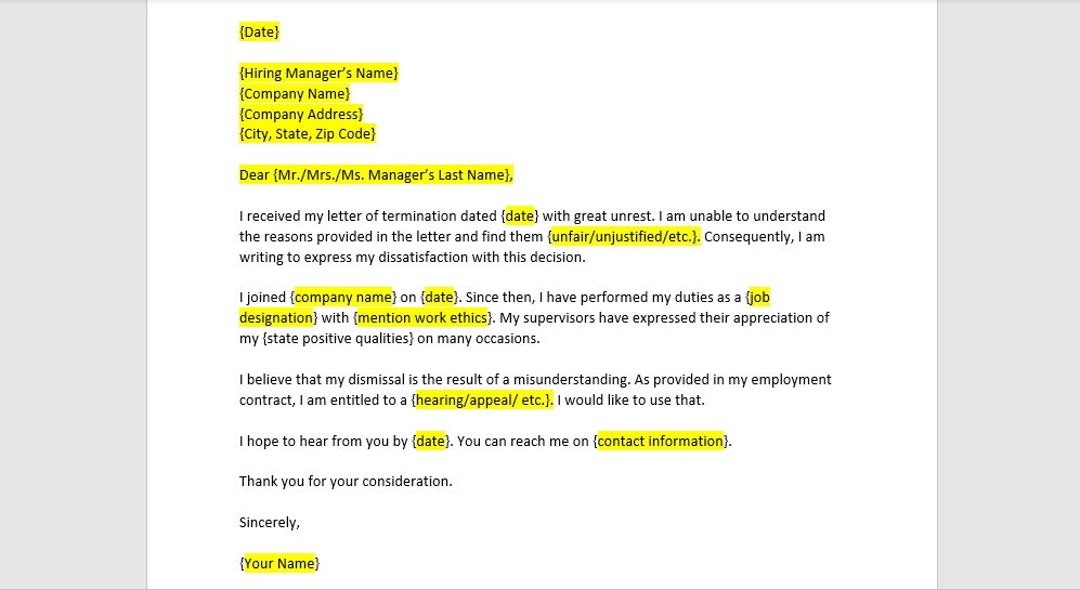
Response Letter to Unfair Dismissal Template Response Letter

What Is Unfair Dismissal?, Employee Dismissal
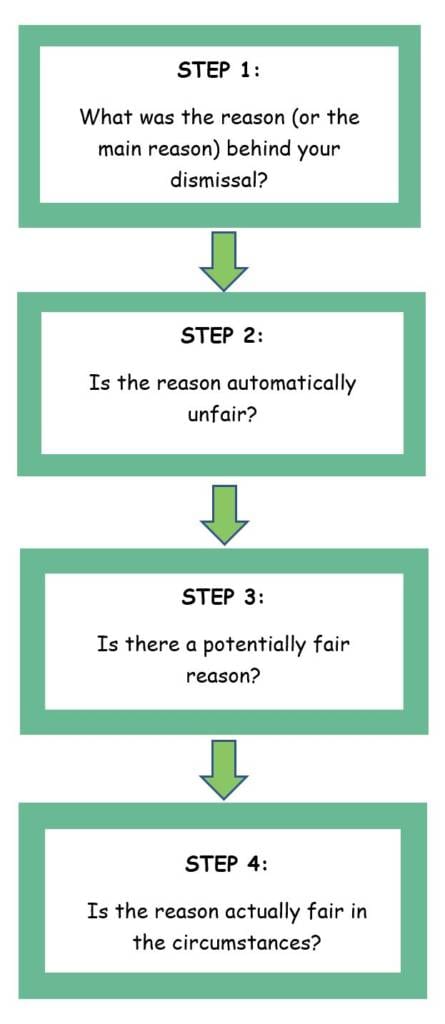
Everything You Need To Know About Unfair Dismissal Claims - Truth

Unfair Dismissal - Sexual Harassment Australia
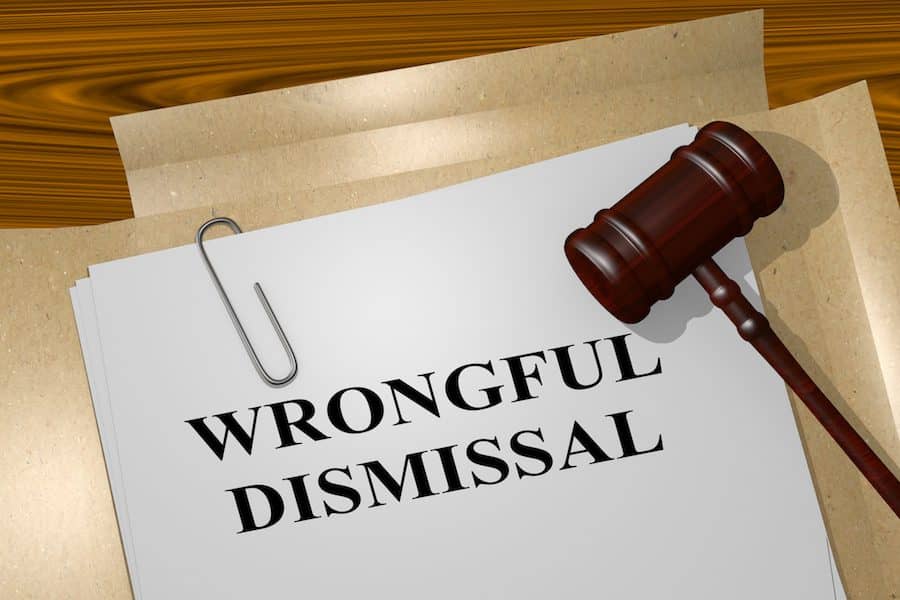
Health and safety dismissal was unfair - Employment News - Wollens
Unfair Dismissal Cases - Murray Wilcox, 2008

The process for unfair dismissal claims

Your Guide To Unfair Dismissal Claims: Baker Deane & Nutt

Unfair Dismissal Law Fifth Edition 2018 Volume One: Wright, John

Speak to the Settlement Agreement Experts Today
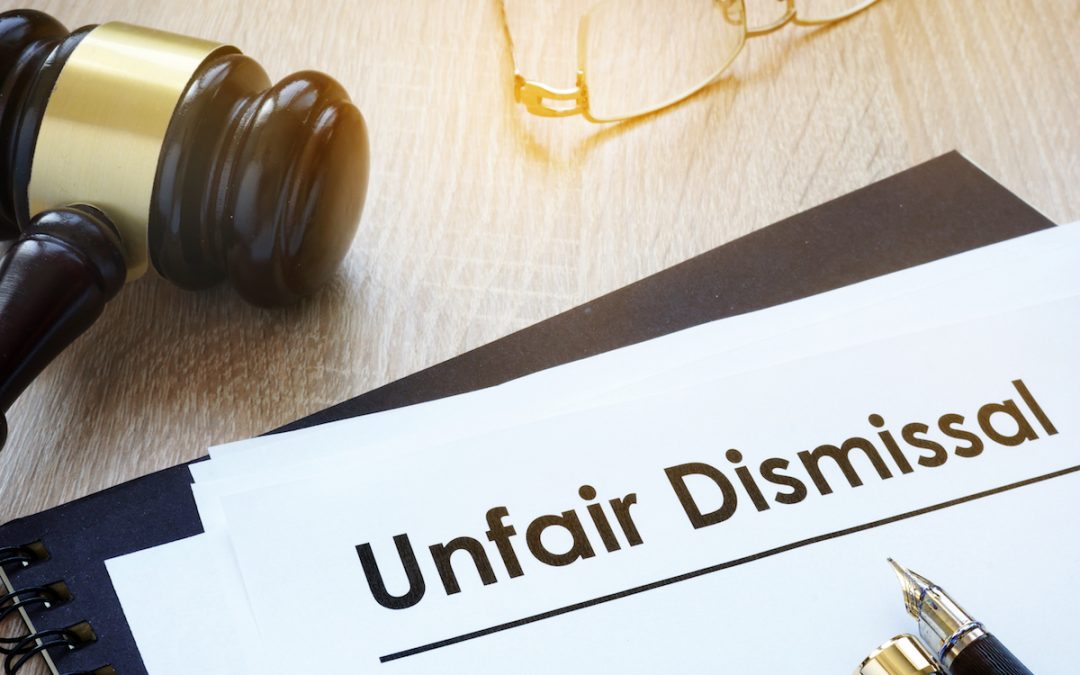
Political Opinions and unfair dismissal - Davenportsolicitors
de
por adulto (o preço varia de acordo com o tamanho do grupo)
